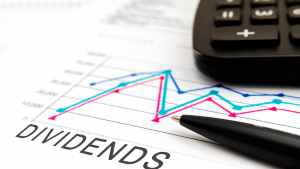The S&P 500 recently fell into a bear market, defined as a 20% year-to-date drop, which has ramifications for dividend stocks.
The good news for investors is that the stock market decline has created buying opportunities for long-term investors. Valuations have come down, while dividend yields are relatively higher as share prices continue to fall.
Investors looking for cheap dividend stocks have more options to choose from. The following three dividend stocks have high potential long-term returns due to their future growth, low valuations and solid dividend yields.
| Ticker | Company | Price |
| SWKS | Skyworks Solutions | $93.34 |
| LII | Lennox International | $208.08 |
| ALLY | Ally Financial | $33.72 |
Dividend Stocks: Skyworks Solutions (SWKS)

First on our list of undervalued dividend stocks, Skyworks Solutions is a semiconductor company that designs, develops and markets proprietary semiconductor products worldwide. Its products include antenna tuners, amplifiers, converters, modulators, receivers and switches. Skyworks’ products are used in diverse industries, including automotive, connected home, industrial, medical, smartphones and defense.
Revenue grew 14% for the second quarter to $1.336 billion. For the first six months of the fiscal year, total revenue rose 6% while earnings-per-share increased 11% versus the same six-month period last fiscal year.
Going forward, Skyworks Solutions is expected to generate growth from a number of potential catalysts. Demand for connectivity to start rapidly expanding across multiple essential wireless protocols, including 5G, advanced Wi-Fi and precision GPS.
Skyworks’ management team provided an outlook for the third quarter of the fiscal year 2022. They anticipate revenue between $1.200 billion and $1.260 billion, with non-GAAP diluted earnings per share of $2.36 at the midpoint. We expect 8% annual EPS growth over the next five years.
Skyworks has enjoyed tremendous growth over the past decade thanks to smartphones’ proliferation that use its chips. The company increased EPS by double-digit percentages each year in the past five and 10-year periods. These past two years of 2020 and 2021 saw a significant upturn for many semiconductor companies, including Skyworks.
Skyworks stock trades for a 2022 P/E ratio of 8.4. Our fair value P/E is 15 for Skyworks, which implies significant upside for the stock. Shares also have a dividend yield of 2.4%. Total returns could reach 22% per year over the next five years.
Lennox International (LII)

Next among dividend stocks is Lennox International, a company that manufactures and sells HVAC products (heating, ventilation, and air conditioning). About 94% of sales come from North America (particularly the U.S. and Canada), and about 6% of sales are international.
The company operates through three segments: residential heating and cooling, commercial heating and cooling, and refrigeration, which made up 66%, 21%, and 13% of 2021 sales, respectively. To preface this business, 75% of sales come from replacements, and only 25% of sales come from new construction – which means that this business’s performance isn’t directly tied to new home sales.
On the residential side, the company is focused on geographic expansion of their store footprint, so they can serve more households. At the end of 2021, the business had 232 stores, and the company expects to add 30 stores in 2022 to bring the store total to 262. The business wants to have 350 stores by 2026.
In the 2022 first quarter, Lennox generated $2.36 in adjusted earnings-per-share, up 4% year-over-year, and revenue increased 9% year-over-year to $1.01 billion. Revenue and profits grew in the residential and refrigeration segments. Overall, the strong performance on the residential side masked underperformance on the commercial side.
The company has a strong track record of growth. In the past five years the company grew its earnings-per-share by 12% annually. Dividends rose 18% per year in the same period. Lennox International has grown dividend payments for 14 consecutive years.
Lennox stock trades for a 2022 P/E of 14.2, which is significantly below its 10-year average around 21. Lennox recently hiked its dividend by 15% and the stock now yields 2.1%. We also expect the company to grow earnings-per-share by 10% per year. As a result, total returns could exceed 20% per year over the next five years.
Dividend Stocks: Ally Financial (ALLY)

Ally Financial, our last dividend stocks entry, provides financial services to consumers, businesses, automotive dealers and corporate clients. Its segments include automotive finance, insurance, mortgage finance and corporate finance. Its services include term loans, lines of credit, fleet financing, vehicle financing, commercial insurance products, etc.
Ally also has a held-for-investment consumer mortgage finance loan portfolio with mortgages that were originated by third parties.
Ally reported first-quarter earnings results on April 14. The company reported revenues totaled $2.1 billion during the quarter, which was 11% more than its revenues during the same quarter a year ago.
Ally originated $12 billion in new consumer auto loans during the quarter and managed to grow deposits by $1.3 billion during the quarter. At the end of the quarter, retail deposits totaled $136 billion. Due to lower provisions and higher revenues, Ally’s bottom-line performance improved markedly on a year-over-year basis, and the company managed to hit net earnings of more than $700 million during the quarter.
ALLY stock earnings-per-share during the first quarter were strong, as the company generated profits of $2.03 per share. Earnings-per-share showed a strong recovery in 2021, as earnings-per-share hit a new record level of $8.60. It is expected that Ally Financial’s earnings-per-share will decline in 2022 due to lower reserve releases, but profits should nevertheless remain well above pre-pandemic levels this year. We expect 3% annual EPS growth over the next five years.
Ally is a shareholder-friendly company that returns cash aggressively through buybacks and dividends. On Jan. 11, the company simultaneously announced a 20% dividend increase and $2 billion share buyback authorization, which represents approximately 18% of the stock’s current market cap. Shares currently have a dividend yield of 3.5%.
The company has increased its dividend for six consecutive years. Ally will pay around 15% of its earnings in the form of dividends this year. This low of a payout ratio leaves plenty of room for future dividend increases.
The stock trades for a 2022 P/E ratio of just 4.3; our fair value P/E is 7.5 which leaves potential returns above 17% per year over the next five years.
On the date of publication, Bob Ciura did not have (either directly or indirectly) positions in any of the securities mentioned in this article. The opinions expressed in this article are those of the writer, subject to the InvestorPlace.com Publishing Guidelines.
